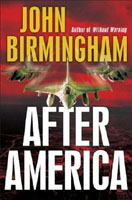 |
John Birmingham, Australian author of After America, blogger, and newspaper columnist has been interviewed by "The Australian Literature Review" weblog. |
Do you read much Australian fiction, and do you have some favourites (other than your own)?
I'm a big fan of Matt Condon's work. I think every book he's written since The Pillow Fight has been worthy of being stamped with a big fat Novel of the Year stamp. He is the best literary novelist working in this country today. Of the genre writers, I can't go past one of Peter Corris's Cliff Hardy novels without immediately placing it within my possession. He seems to have written hundreds of these things, but they never lose their freshness and sizzle.
Is there any specific kind of fiction you would like to see more of in Australia?
Zombie-First Fleet-Time travel-crossovers. I don't know why we don't see more of these. The field is wide open, people!
Many books about fiction writing neglect character, or treat the topic haphazardly or in an overly structured way. What is your response to the suggestion that the book How to be a Man, by yourself and Dirk Flinthart, could be a useful tool for writers to use for thinking about developing fictional characters?
My response is flabbergasterment! That is the first time anybody has suggested that to me ever. But I guess when thinking it, about the way we build characters for novels, yeah, why not. I might even do it myself next time. The character question is an interesting one though. A lot of literary fiction seems to emphasize character, and in particular internal character struggles, over story. That's why I think, for the most part, literary fiction doesn't sell very well. People like stories. Having said that, of course, one of the most frequent criticisms of genre fiction is that the characters are all wooden and two-dimensional. And look, often that's true. But often it's not. I just finished a book by Peter V. Brett, The Desert Spear, the second in his demon war series. And instantly people are rolling their eyes and thinking, oh God, not another sub-Tolkien sword and sandal marathon. But they'd be wrong to think that. Pete's book is awesome, not just because of the really tight control he wields over a truly epic narrative, but because his command of character is every bit as good as any self-declared literary novelist.
